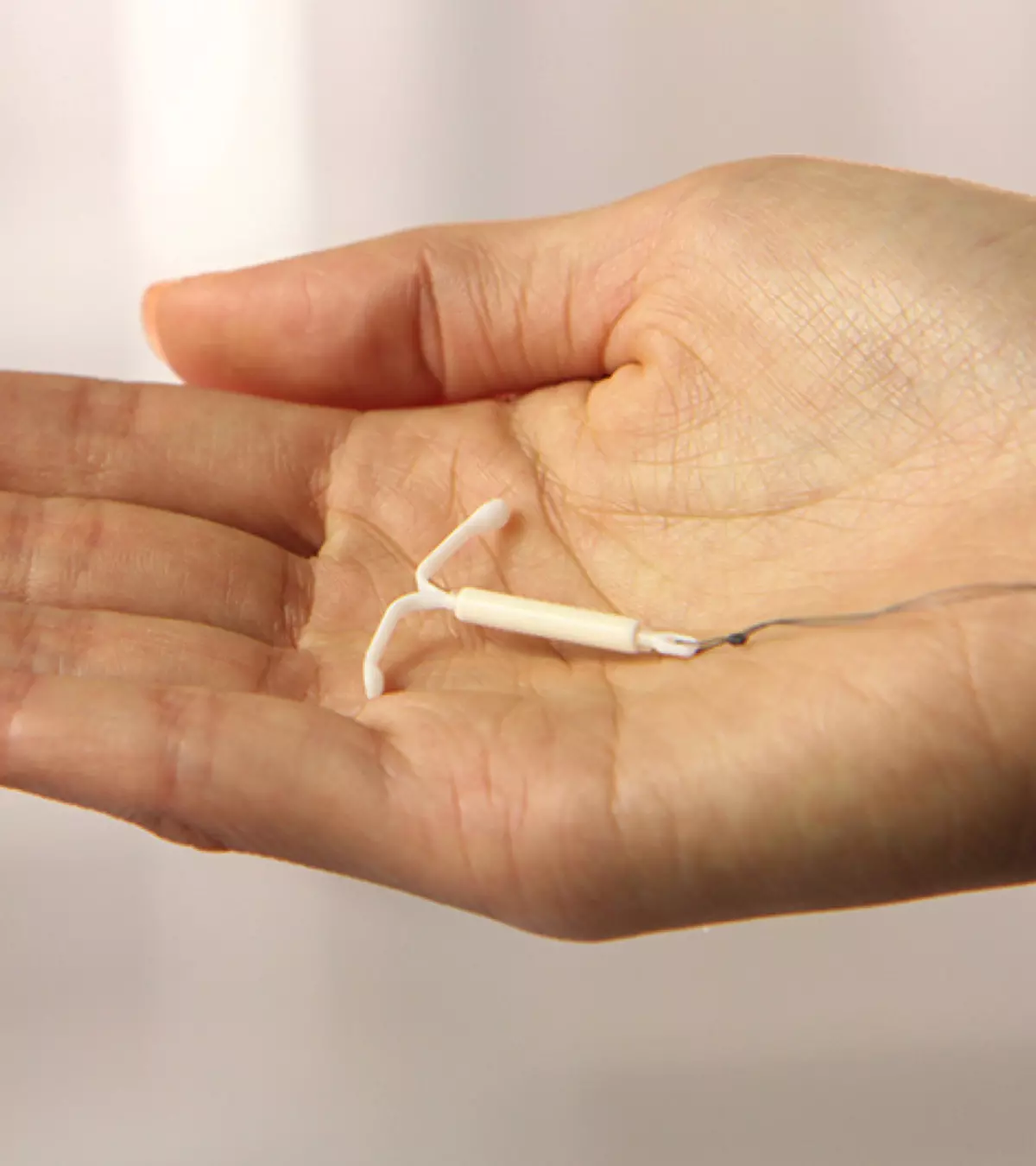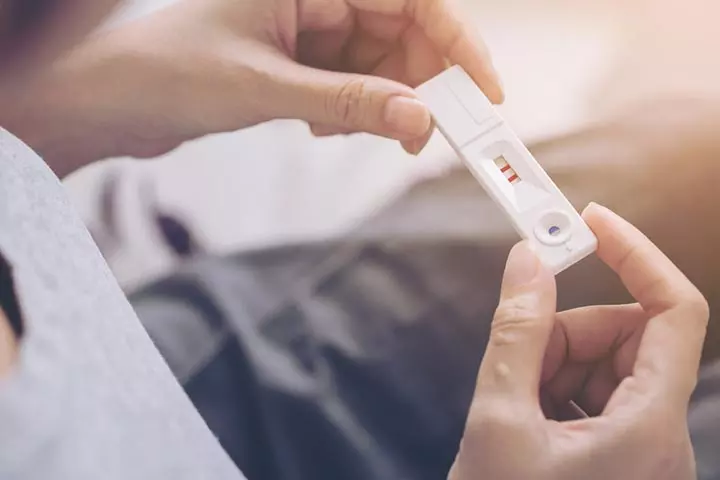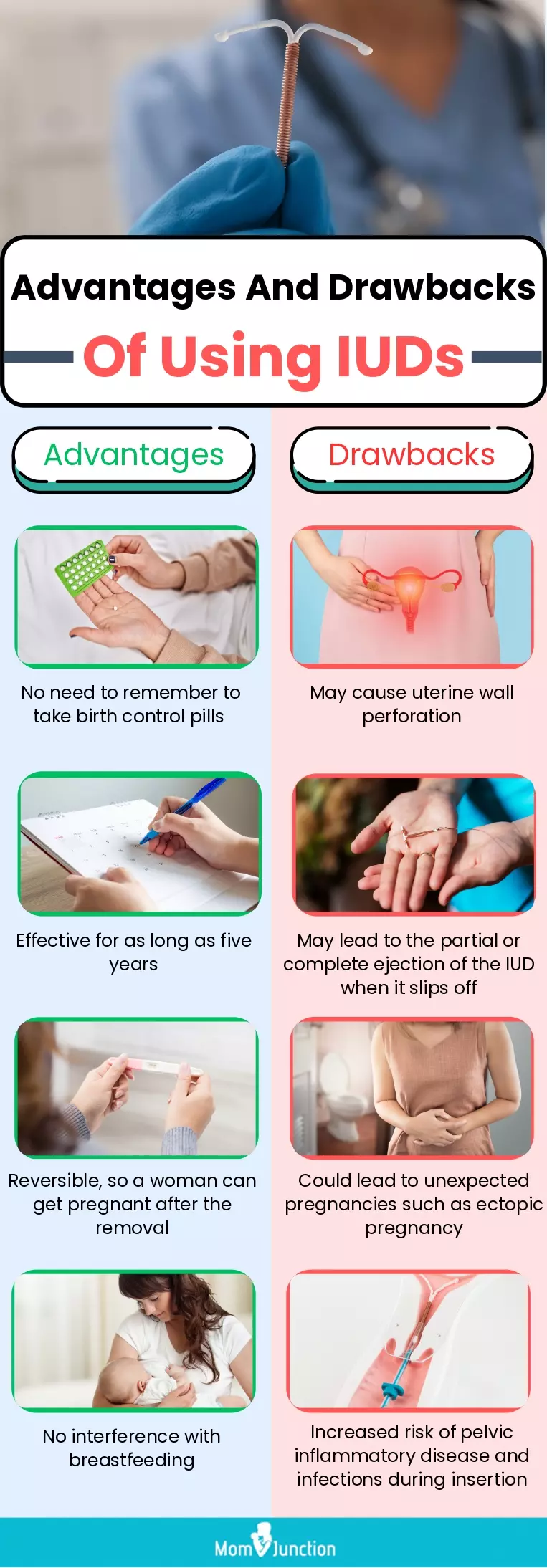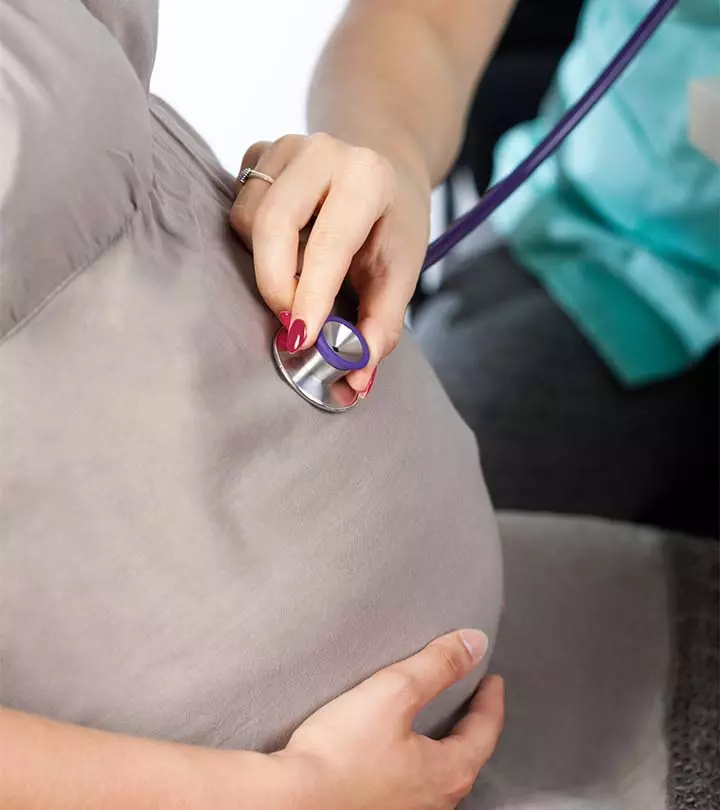
Image: ShutterStock
Mirena is one of the intrauterine devices (IUDs) used as a contraceptive in family planning. But some women on birth control may have doubts regarding pregnancy after mirena removal. Keep reading to find the answer to your question.
According to the United Nations Department of Economic and Social Affairs 2022 report, 161 million women worldwide use intrauterine devices (IUDs) as their preferred method for effective birth control. Studies highlight that only one out of 100 women using IUDs may get pregnant (1). This post will tell you about Mirena’s efficacy, the chances of pregnancy after its removal, and pregnancy while on IUD.
Key Pointers
- Mirena is a 5-year, effective birth control method that releases the hormone Levonorgestrel.
- IUDs are a reversible birth control method that doesn’t interfere with breastfeeding.
- IUD complications include pain, bleeding, dizziness, uterine perforation, and risk of pelvic inflammatory disease.
- Mirena users have low pregnancy risk, but incorrect insertion, expulsion, or extended use can lead to pregnancy.
- Pregnancy symptoms with Mirena are similar to regular pregnancy and can be confirmed with a clinic blood test.
What Is Mirena And How Does It Work?
Mirena is a brand of T-shaped hormonal intrauterine device used for long-term birth control. This FDA-approved IUD is labeled to have an effectiveness of five years (2). It can only be placed by a healthcare provider.
Insertion of Mirena takes about five minutes and can be done during a regular visit to the doctor. The device is inserted using a few tools. It can be inserted at any time during the month, even during menstruation, if you are not pregnant (3). If you are breastfeeding, your doctor will tell you about the right time to get it.
Mirena IUD works by releasing the hormone Levonorgestrel. This hormonal change will thicken the mucus lining of the cervix to prevent the sperm from meeting or fertilizing the egg. It also thins the uterine lining, thereby, suppressing the ovulation partially. All of these will prevent pregnancy (4).
How Does IUD Help?

Image: Shutterstock
The IUD method of birth control might help in these ways (5) .
- It is an effective contraception method.
- You need not worry about remembering to take a contraceptive pill.
- It works for up to five years.
- It is reversible, and is possible to get pregnant once it is removed by a healthcare provider.
- It does not interfere with breastfeeding.
Are There Any Complications With IUD?
The effects of IUD need not be the same for every woman. Some women may have pain, bleeding, and dizziness during and after insertion.
A few women might have more serious complications such as (6).
- Initial unexpected spotting per vaginum
- Perforation of the uterine wall
- Partial or complete expulsion of IUD where it spontaneously falls off
- Unexpected pregnancies such as ectopic pregnancy
- Increase in the risk of pelvic inflammatory disease (PID)iAn infection of the female reproductive organs caused by STDs and other infections resulting in lower abdominal pain. on exposure to chlamydiaiA bacterial infection spread through oral, anal, or vaginal intercourse. or gonorrheaiAn infection of the genitals, rectum, and throat spread through sexual contact. while inserting IUD.
 Things to know
Things to knowCan You Get Pregnant When On Mirena?

Image: Shutterstock
Statistics show that less than one woman among every 100 using IUD is likely to get pregnant within the first year of usage (7). In rare cases, you may get pregnant with Mirena for the following reasons:
- Keeping the Mirena past its removal time or manufacturer’s approved timeline. According to a medical review, Mirena was found to be effective up to seven years in women who are 25 years old at the time of insertion, and who had children (8). Later, the FDA revised its recommended timeline to five years.
- If the device is not inserted in the right place. If the Mirena translocates from the upper to the lower segment of the uterus, it does not work. In some cases, IUD might perforate the uterus, which may increase the probability of conception. For these reasons, you should get your Mirena device checked once every month if it is placed correctly and without any complications (9).
- If the body expels the device out of the uterus. There may be chances for the Mirena to fall off and you may get pregnant. According to the American College of Obstetricians and Gynecologists (ACOG) statistics, expulsion rates of IUD range from 2% to 10%, which may mostly occur soon after inserting the device (9).
 Quick fact
Quick factWhat Happens If You Get Pregnant On Mirena?

Image: Shutterstock
If you become pregnant on Mirena, there might be an increased risk to your reproductive health such as an ectopic pregnancy or tubal pregnancy. It is the pregnancy where the embryo implants outside the uterus or in the fallopian tubes.
The other probable risks could be (9):
- Miscarriage
- Premature delivery
- Chorioamnionitis, which is the inflammation of the fetal membranes.
 Point to consider
Point to considerAn Obstetrics and Gynaecology specialist may recommend removing the Mirena to avoid these complications. In some cases, Mirena cannot be reached as the uterus grows. Therefore, it is left in its place not to harm the pregnancy or the mother.
How Soon Can You Get Pregnant After Mirena IUD Removal?
Around eight out of ten women were found to get pregnant within one year of IUD removal (10).
Signs of Pregnancy with Mirena IUD

Image: Shutterstock
The signs of pregnancy with Mirena are the same as signs of any regular pregnancy. You will experience breast tenderness, nausea, fatigue, mild cramps, and light spotting along with missed periods. Some of these symptoms are similar to Mirena side effects. Therefore, you should check with a doctor to find the reason. You may also take a home pregnancy test if you missed your period.
An at-home pregnancy test may not indicate pregnancy as early as a blood test. Only the tests at a clinic can rightly detect a pregnancy.
Next, we answer some common queries that come up with Mirena usage.
Frequently Asked Questions
1. Can Mirena cause a false negative pregnancy test?
Mirena may not affect pregnancy results by causing a false-negative test. A false pregnancy test occurs due to reasons such as low level of hCG hormone in the urine and doing the test improperly (11).
2. Can Mirena affect your fertility?
The hormonal Mirena is not known to affect fertility.
3. Does Mirena cause miscarriage after removal?
Mirena is unlikely to cause miscarriages after removal. If the insertion and removal are done right, the usage of Mirena or any other IUD is not known to lead to any risk in future pregnancies.
4. How long can an IUD remain in place during pregnancy?
Doctors recommend removing the IUD as soon as possible in early pregnancy since leaving the IUD inside may cause pregnancy complications. However, it is possible only if the IUD strings in the cervix are visible to allow its removal. If the IUD strings curl up into the cervix, your doctor may use ultrasound to retrieve the device. Otherwise, it may have to be left in place to avoid injury to the mother or pregnancy until gestation is complete (12).
5. Is it safe to have an IUD inserted in the first trimester of pregnancy?
No, having an IUD inserted in the first trimester of pregnancy is unsafe. It may increase the risk of pregnancy complications, such as miscarriage, preterm birth, and infection of the amniotic sac and fluid (12).
Knowing the correct information about Mirena (IUD) and pregnancy can help you prevent or plan pregnancy. These intrauterine devices release hormones and prevent pregnancy for up to five years. You may insert Mirena from a certified gynecologist to avoid injuries such as uterine perforation during the procedure. Ask for the removal time or manufacturer-approved timeline to remove the device in time to prevent unplanned pregnancies. Even if the timeline has passed, it is advised to remove Mirena before planning pregnancy since it may cause adverse effects such as tubal pregnancy, miscarriage, and premature births.
Infographic: Benefits And Complications Associated With IUDs
Long-term contraceptive methods, such as IUDs (intrauterine devices), can help avoid unwanted or unplanned pregnancies. But, every method has its benefits and complications, as do IUDs. Explore this infographic to learn about the benefits and drawbacks of using IUDs for contraception to make an informed decision.

Illustration: Momjunction Design Team
Illustration: Can You Get Pregnant With Mirena (IUD)?
_illustration.jpg.webp)
Image: Dall·E/MomJunction Design Team
References
- Birth Control; U.S. FDA (2018)
http://www.fda.gov/consumers/womens-health-topics/birth-control - Anita L Nelson and Natasha Massoudi; New developments in intrauterine device use: focus on the US; Open Access J Contracept (2016)
https://www.ncbi.nlm.nih.gov/pmc/articles/PMC5683151/ - What is an IUD?; Indian University
https://healthcenter.indiana.edu/health-answers/gyn-health/iud.html - Insertion and Removal of Intrauterine Devices; American Family Physician (2005)
https://www.aafp.org/pubs/afp/issues/2005/0101/p95.html - Intrauterine Device (IUD); SexInfo Online; University of California Santa Barbara (2017)
https://sexinfoonline.com/intrauterine-device-iud/ - Intrauterine devices (IUD); MedlinePlus
https://medlineplus.gov/ency/article/007635.htm - How effective are IUDs?; Planned Parenthood
https://www.plannedparenthood.org/learn/birth-control/iud/how-effective-are-iuds - Justine P.Wu and Sarah Pickle; Extended use of the intrauterine device: a literature review and recommendations for clinical practice; Contraception Journal ScienceDirect (2014)
https://www.sciencedirect.com/science/article/abs/pii/S0010782414000584 - Long-Acting Reversible Contraception: Implants and Intrauterine Devices; American College of Obstetricians and Gynecologists (2018)
https://www.acog.org/clinical/clinical-guidance/practice-bulletin/articles/2017/11/long-acting-reversible-contraception-implants-and-intrauterine-devices - Mirena® (levonorgestrel-releasing intrauterine system); Bayer HealthCare Pharmaceuticals (2008)
https://www.accessdata.fda.gov/drugsatfda_docs/label/2008/021225s019lbl.pdf - When is the best time to take pregnancy test?; The Ohio State University
https://wexnermedical.osu.edu/blog/best-time-to-take-pregnancy-test - What happens if I get pregnant with an IUD?
https://utswmed.org/medblog/pregnancy-iud/
Community Experiences
Join the conversation and become a part of our nurturing community! Share your stories, experiences, and insights to connect with fellow parents.
Read full bio of Dr. Shashwat Jani
Read full bio of Rebecca Malachi
Read full bio of Dr. Ritika Shah
Read full bio of Reshmi Das


















